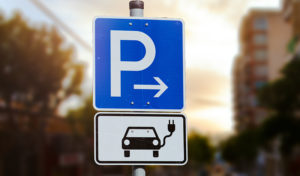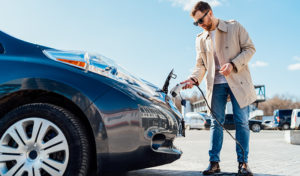Electric vehicles are poised to grow in popularity over the following years as people shift towards a more energy-conscious mindset. But, unlike the traditional cars that run on gas, EVs are powered by electricity — and charging stations are not readily available everywhere. Hence, many owners are turning to HOA electric vehicle charging.
Benefits of HOA Electric Vehicle Charging Stations
A lot of people know homeowners associations for their strict rules when it comes to the exterior appearance of the community. These rules exist to maintain the aesthetic appeal of the HOA and keep property values high. Hence, any external changes homeowners wish to make must receive HOA approval first. As the world moves to more sustainable solutions, the topics of electric vehicles and the installation of charging stations naturally come up.
With EV charging stations in the community, property owners who drive electric vehicles will benefit the most. But, that does not mean the HOA itself does not stand to gain anything. On the contrary, homeowners associations can also benefit from the installation of EV charging stations. These include but are not limited to the following:
- The HOA can position itself as an environmentally-friendly community and use that to market itself to potential new residents.
- Installing EV charging stations allows the HOA to get ahead of the demand for EVs as the industry grows.
- The HOA can receive Leadership in Energy & Environmental Design (LEEDS) points.
State Laws on HOA Electric Vehicle Charging
The first thing homeowners associations must do is to check their state laws. Several states have already enacted laws promoting the use of electric vehicles. For instance, California Civil Code Section 4745 disallows covenants that “effectively prohibits or unreasonably restricts the installation or use of an electric vehicle charging station within an owner’s unit or in a designated parking space.” This applies to HOA communities as well and deems any such covenants or rules unenforceable.
Considering the trajectory of sustainable energy laws, other states may follow suit within the next few years. As such, even HOAs in states with no current EV laws should prepare themselves for the probable changes. This means creating rules and setting standards for the installation of HOA electric vehicle charging stations.
Setting Standards for HOA EV Charging Stations
 While an HOA may not be able to prohibit EV charging stations altogether, it can set reasonable restrictions that do not significantly decrease the efficiency of the station or significantly increase its cost of it. In addition to complying with local health and safety standards as well as zoning and land-use restrictions, HOAs can impose additional requirements for homeowners to follow. This includes going through an application process and securing the HOA’s approval prior to installing the EV charging stations.
While an HOA may not be able to prohibit EV charging stations altogether, it can set reasonable restrictions that do not significantly decrease the efficiency of the station or significantly increase its cost of it. In addition to complying with local health and safety standards as well as zoning and land-use restrictions, HOAs can impose additional requirements for homeowners to follow. This includes going through an application process and securing the HOA’s approval prior to installing the EV charging stations.
Owner Requirements
According to California law, homeowners must obtain the approval of the HOA and provide a written agreement to the following:
- The charging station must comply with the association’s architectural standards;
- The owner must use a licensed contractor to install the EV charging station;
- Within 14 days of receiving the HOA’s approval, the owner must provide a certificate of insurance that lists the HOA as an additional insured in the insurance policy; and,
- Pay for the cost of electricity associated with the use of the charging station.
While these specifically apply to California HOAs, other associations can use them as a guide to creating their own requirements.
Owner Responsibilities
It is equally important to clarify the duties of the owner in relation to the EV charging station. Once approved and installed, the owner of the station must shoulder the following responsibilities:
- Any maintenance, repairs, and replacements necessary for as long as the station remains in the common area or exclusive use common area;
- Any damages to the station, adjacent units, common areas, and exclusive common areas arising from the installation, removal, replacement, maintenance, or repair of the station;
- The disclosure of the EV charging station to potential homebuyers as well as the disclosure of the associated owner responsibilities falling under this section;
- Electricity related to the EV charging station; and,
- Purchase and maintain a liability insurance policy.
Notice for Future Owners
Homeowners associations may run into some problems when EV charging station owners eventually sell their homes. But, owner responsibilities should transfer from the old owner to the new one.
To avoid trouble, HOAs should enter a signed agreement with the owner, requiring them to notify buyers or future owners of the existence of the EV charging station. Current owners must also outline the responsibilities that future owners will need to shoulder once the property changes hands. These responsibilities include maintaining the charging station and keeping the proper insurance policy.
This is particularly significant because not everyone owns an electric vehicle. Thus, potential buyers should be made aware of the additional obligations that come with the purchase of the home. Of course, current owners always have the option of removing the charging station at their own personal expense.
Timeline for Approval of HOA Electric Vehicle Charging Stations
Boards must also set a standard timeline for the approval of electric vehicle charging stations in homeowner associations. Generally, it is a good idea to treat this application process in the same way as any other architectural change application. Board members must not purposely delay or ignore the applications that homeowners submit. Additionally, boards must provide any approvals or denials in writing.
It is worth noting that California law considers an application automatically approved if the board fails to deny it in writing within 60 days from receipt. The only exception is if the decision was delayed due to a reasonable request for additional details coming from the owner.
Electric Vehicle Charging Stations in HOA for Public Use
 Most requests for EV charging stations come from owners who wish to use them for personal purposes. But, homeowners associations can install public EV charging stations for the use of all members. In this case, HOAs can also create rules pertaining to the use of these public stations. Associations can also make new parking spaces to accommodate the stations. This is more commonly seen with condo electric car charging stations.
Most requests for EV charging stations come from owners who wish to use them for personal purposes. But, homeowners associations can install public EV charging stations for the use of all members. In this case, HOAs can also create rules pertaining to the use of these public stations. Associations can also make new parking spaces to accommodate the stations. This is more commonly seen with condo electric car charging stations.
Conversely, an owner may want to install a private electric vehicle charging station but have no personal place for it. California law allows owners to install private stations in common areas if it is impossible or unreasonably expensive to do so in an exclusive use common area.
Taking Action
The subject of HOA electric vehicle charging is increasingly gaining traction in the industry. This comes as no surprise as sustainability becomes a more critical point of conversation. State laws or not, homeowners associations should make the necessary adjustments to accommodate this change in demand sooner than later.
Cedar Management Group assists homeowners associations with legal compliance and many other things. Call us today at (877) 252-3327 or contact us online to learn more about our services.
RELATED ARTICLES:
- HOA Parking Issues: How To Deal With This Problem
- North Carolina Solar Installations In HOAs: Can It Be Restricted?
- South Carolina Uniform Act Regulating Traffic To Private Roads Explained






